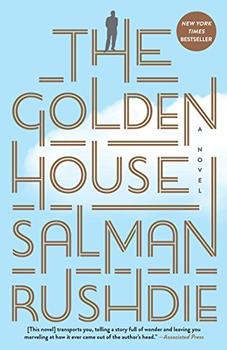Summary | Excerpt | Reading Guide | Reviews | Beyond the Book | Readalikes | Genres & Themes | Author Bio

A Novel
by Salman Rushdie
But on that cold January day in 2009 when the enigmatic septuagenarian we came to know as Nero Julius Golden arrived in Greenwich Village in a Daimler limousine with three male children and no visible sign of a wife, he at least was firm about how virtue was to be valued, and right action distinguished from wrong. "In my American house," he told his attentive sons in the limousine as it drove them from the airport to their new residence, "morality will go by the golden standard." Whether he meant that morality was supremely precious, or that wealth determined morality, or that he personally, with his glittering new name, would be the only judge of right and wrong, he did not say, and the younger Julii, from long filial habit, did not ask for clarification. (Julii, the imperial plural they all preferred to Goldens: these were not modest men!) The youngest of the three, an indolent twenty-two-year-old with hair falling in beautiful cadences to his shoulders and a face like an angry angel, did however ask one question. "What will we say," he asked his father, "when they inquire, where did you come from?" The old man's face entered a condition of scarlet vehemence. "This, I've answered before," he cried. "Tell them, screw the identity parade. Tell them, we are snakes who shed our skin. Tell them we just moved downtown from Carnegie Hill. Tell them we were born yesterday. Tell them we materialized by magic, or arrived from the neighborhood of Alpha Centauri in a spaceship hidden in a comet's tail. Say we are from nowhere or anywhere or somewhere, we are make-believe people, frauds, reinventions, shapeshifters, which is to say, Americans. Do not tell them the name of the place we left. Never speak it. Not the street, not the city, not the country. I do not want to hear those names again."
They emerged from the car in the old heart of the Village, on Macdougal Street a little below Bleecker, near the Italian coffee place from the old days that was still somehow struggling on; and ignoring the honking cars behind them and the outstretched supplicant palm of at least one grubby panhandler, they allowed the limousine to idle in mid-street while they took their time lifting their bags from the trunk—even the old man insisted on carrying his own valise—and carried them to the grand Beaux-Arts building on the east side of the street, the former Murray mansion, thereafter to be known as the Golden house. (Only the eldest son, the one who didn't like being out of doors, who was wearing very dark dark glasses and an anxious expression, appeared to be in a hurry.) So they arrived as they intended to remain, independently, with a shrugging indifference to the objections of others.
The Murray mansion, grandest of all the buildings on the Gardens, had lain largely unoccupied for many years, except for a notably snippy fifty-something Italian-American house manager and her equally haughty, though much younger, female assistant and live-in lover. We had often speculated on the owner's identity, but the fierce lady guardians of the building refused to satisfy our curiosity. However, these were years in which many of the world's super-rich bought property for no reason other than to own it, and left empty homes lying around the planet like discarded shoes, so we assumed that some Russian oligarch or oil sheikh must be involved, and, shrugging our shoulders, we got used to treating the empty house as if it wasn't there. There was one other person attached to the house, a sweet-natured Hispanic handyman named Gonzalo who was employed by the two guardian dragons to look after the place, and sometimes, when he had a bit of spare time, we would ask him over to our houses to fix our wiring and plumbing problems and help us clear our roofs and entrances of snow in the depths of winter. These services, in return for small sums of cash money folded discreetly into his hand, he smilingly performed.
Excerpted from The Golden House by Salman Rushdie. Copyright © 2017 by Salman Rushdie. Excerpted by permission of Random House. All rights reserved. No part of this excerpt may be reproduced or reprinted without permission in writing from the publisher.




The fact of knowing how to read is nothing, the whole point is knowing what to read.
Click Here to find out who said this, as well as discovering other famous literary quotes!
Your guide toexceptional books
BookBrowse seeks out and recommends the best in contemporary fiction and nonfiction—books that not only engage and entertain but also deepen our understanding of ourselves and the world around us.